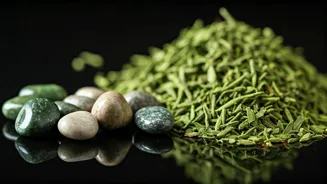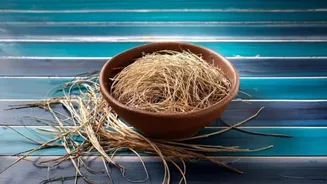Understanding Kidney Stones
Kidney stones, also termed renal calculi, are hard deposits that form within your kidneys. They originate from minerals and salts present in urine, and factors
like diet, excess body weight, certain medical conditions, and insufficient water intake contribute to their development. The size of these stones can vary significantly. Some are as tiny as a grain of sand, while others can grow to the size of a golf ball. Common symptoms include sharp pain in the side and back, often radiating to the lower abdomen and groin. Other signs can include pain during urination, persistent need to urinate, nausea, vomiting, and blood in the urine. Prompt diagnosis and treatment are important to alleviate the discomfort and prevent complications, and this is where Ayurveda comes into play.
Ayurveda's Perspective on Stones
Ayurveda views kidney stones through the lens of its foundational principles. It posits that the imbalance of the three doshas—Vata, Pitta, and Kapha—contributes to stone formation. In Ayurveda, Vata is associated with movement, Pitta with metabolism and transformation, and Kapha with structure and lubrication. An excess of Kapha and Vata doshas can lead to the accumulation of waste materials. These waste products can solidify and form stones. Ayurvedic treatment focuses on restoring balance among these doshas through diet, lifestyle adjustments, and herbal remedies. The goal is to eliminate the stones and prevent their recurrence by addressing the underlying imbalances.
Ayurvedic Diagnosis Methods
In Ayurveda, the approach to diagnosing kidney stones involves a holistic assessment. Practitioners begin by evaluating the patient's constitution, known as Prakriti, and the current state of imbalance, or Vikriti. This involves a detailed consultation that includes reviewing the patient's medical history, dietary habits, and lifestyle. The practitioner may use pulse diagnosis (Nadi Pariksha) to assess the doshas, and examine the tongue, eyes, and nails for indications of imbalances. They may also inquire about the patient’s bowel movements, sleep patterns, and emotional state. Urine and blood tests are also used to confirm stone presence and composition, helping doctors to understand the specific nature of the imbalance that is contributing to the formation of the kidney stones. Based on this assessment, a personalized treatment plan is created.
Herbal Remedies for Relief
Ayurvedic medicine employs a variety of herbs for managing kidney stones, often with the aim of dissolving the stones and relieving discomfort. Some commonly used herbs include: *Varuna:* Known for its diuretic properties, Varuna (Crataeva nurvala) can aid in flushing out the stones and has anti-inflammatory effects. *Pashanbhed:* Literally meaning 'stone breaker', Pashanbhed (Saxifraga ligulata) is believed to dissolve kidney stones. It has diuretic and anti-inflammatory characteristics. *Punarnava:* This herb (Boerhavia diffusa) is a diuretic and is used to reduce swelling and inflammation. *Gokshura:* Gokshura (Tribulus terrestris) can improve kidney function and decrease pain. It also possesses diuretic properties. These herbs are typically taken in the form of decoctions, powders, or capsules, and should be used under the guidance of an Ayurvedic practitioner, who can determine the appropriate dosages and combinations.
Dietary Guidelines in Ayurveda
Diet plays a crucial role in Ayurvedic treatments for kidney stones. The dietary approach is designed to balance the doshas and reduce the formation of stones. Specific recommendations may vary based on the individual's constitution and the nature of the stones. Generally, an Ayurvedic diet for kidney stones focuses on: *Increasing Fluid Intake:* Drinking plenty of water helps in flushing out the stones and preventing dehydration, which can contribute to stone formation. *Avoiding Oxalate-Rich Foods:* Oxalates, found in foods like spinach, rhubarb, and chocolate, can increase stone formation. Reducing these foods in the diet may be beneficial. *Limiting Salt Intake:* High salt intake can increase the risk of calcium stone formation, thus it is advised to reduce salt intake. *Incorporating Diuretic Foods:* Foods like watermelon, cucumber, and celery can promote urination and may help in flushing out stones.
Lifestyle Adjustments
Alongside diet and herbal remedies, Ayurveda emphasizes lifestyle adjustments to manage and prevent kidney stones. These adjustments contribute to overall well-being and help in maintaining doshic balance. *Staying Hydrated:* Drinking ample water is crucial to prevent stone formation. Aim for at least 8-10 glasses of water a day. *Managing Stress:* High-stress levels can exacerbate health issues and contribute to doshic imbalances. Incorporate stress-reducing activities such as yoga, meditation, or deep breathing exercises. *Regular Exercise:* Regular physical activity can help maintain a healthy metabolism and reduce the risk of stone formation. However, avoid strenuous exercises if experiencing pain. *Consistent Sleep Schedule:* Ensure adequate sleep to support the body’s natural detoxification processes and promote overall health. *Avoiding Prolonged Sitting:* Sitting for extended periods can worsen conditions like kidney stones. Make sure to get up and move around.
Preventing Future Stones
Preventing the recurrence of kidney stones is a key goal in Ayurveda. After initial treatment and stone elimination, a long-term strategy is implemented. *Continuing Dietary Adherence:* Maintaining a balanced diet, avoiding oxalate-rich foods, and staying well-hydrated are essential. *Regular Follow-Ups:* Regular check-ups with an Ayurvedic practitioner can help monitor the body’s balance and identify any early signs of recurrence. *Herbal Supplements:* Under the guidance of a practitioner, taking herbal supplements can help prevent recurrence. *Maintaining a Healthy Weight:* Maintaining a healthy weight can reduce the risk of various health issues, including kidney stones. *Following a Routine:* Stick to a daily routine that encompasses diet, exercise, and stress management techniques to promote sustained wellness.



















